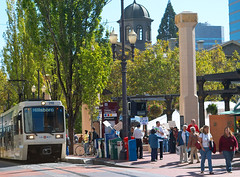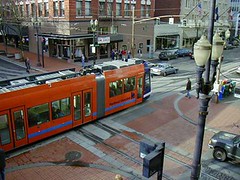A really really bad article in the Washington Monthly
 Flickr photo by David Wyman.
Flickr photo by David Wyman."To be a fully functioning citizen in this country today, a car is a virtual necessity; so the federal government should subsidize a set of wheels and the commute to work" even more than it already does, a minimum of $200 billion/year in the military budget related to maintaining access to foreign oil, 50% of the cost of roads, the provision of free parking to government workers, etc. (my points in bold)
In "A Car In Every Garage," the author argues that, especially to end poverty, the policy choice should be to give everyone a car, and she fails to address the factors, such as land use planning that allows job locations to be disconnected from efficient transit options, etc., which make car dependence a virtual necessity for many.
And as the Location Efficient Mortgage program makes very clear, by not being auto-dependent, and living on transit lines, families can cut spending on transit and put that money into buying a house. (The average household spends up to 20% of its annual income on automobile-related transportation.)
From a brochure about the LEM : "People who live in location-efficient communities reap many rewards. Stores, schools, and public transit, all lie within walking distance of their homes. They have less need to drive, which gives them more discretionary income. They’re more likely to know their neighbors. Their frequent use of local amenities saves energy, which means cleaner air for us all!"
So rather than deal with the issues of deconcentration, sprawl, gasoline dependence, the likelihood of peak oil, and the impact that this has on our society economically, spatially, culturally, and in terms of foreign policy choices (read: wars to ensure continued access to oil) she suggests everyone, particularly the poor, get a car.
Hmm. So much for the pathbreaking nature of Washington Monthly.
From the article:
Among the many unpleasant realities exposed by Hurricane Katrina and its aftermath--from persistent income and racial disparities to the chronic incompetence of the Bush administration--one of the most surprising, to many, was this: our nearly total dependence on automobiles.
Nowhere was this clearer than in the exodus from New Orleans itself. The difference between those who escaped with their lives and loved ones, and those who did not, often came down to access to a car and enough money for gas. Now, in the recovery stage, many of those who were left behind have been evacuated to trailer-park camps, where they are likely to be worse off than they were before, in part because they cannot get to where the jobs are.
 Bike, car, walking, and bus are mobility options in the Hawthorne Distrit of Portland. Photos from Portland Ground.
Bike, car, walking, and bus are mobility options in the Hawthorne Distrit of Portland. Photos from Portland Ground. And transit options abound, with light rail
And transit options abound, with light rail and streetcar, in addition to bus.
and streetcar, in addition to bus.Index Keywords: car-culture, sprawl, poverty



0 Comments:
Post a Comment
<< Home